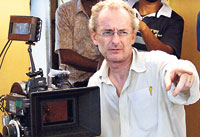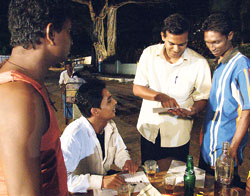Four years down the line, the disappearance of Sri Lanka’s one and only National Handball Team (SLNHT) in Bavaria has become the stuff of legend. Amazingly, those 23 men had no training and knew virtually nothing about handball. Despite this, they were audacious enough to postpone their escape and actually take part in three games held by the Asian-German Sports Exchange Programme before vanishing.
In their wake, disgruntled German authorities were left complaining that all that remained of the team was their dirty laundry. Now a new film, directed by Uberto Pasolini, producer of ‘The Full Monty,’ and written by Ruwanthie de Chickera, is taking their story to the world...and using it to provoke discussion on an issue which has long claimed more than its share of tragedy - illegal immigration.
 |
 |
| Uberto Pasolini: Directorial debut |
Ruwanthie de Chickera: First screenplay |
Titled ‘Machan’, the movie marks Uberto’s directorial debut, and has been screened to wide acclaim at both the Venice Film Festival and the Toronto Film Festival. At the former, it was judged the best film of the Venice Days sidecar (which included 12 other movies) and dubbed as such by the Europa Cinemas Label. Looking back, Uberto says, “As soon as I read the short news agency piece about the Sri Lanka National Handball Team disappearing in Germany I felt this was an opportunity to talk about serious, universal issues through the humour inherent in the plan of the original 23.”
The Full Monty captured the sense of frustration and failure that dogs the life of a group of unemployed men who eventually decide to strip for money. Still, the plot was pure invention. “This time I really did not have to invent anything. The members of the SLNHT did it for me, allowing us to talk about poverty in the developing world, the desire of many to come to the west and improve their lives and that of those they leave behind, even, I believe, the mistaken immigration policies of much of the west...all this not through drama and tragedy, but with an engine to the film of absurdist humour,” he said.
“One of the things that Uberto and I ‘clicked’ on was the need for and the degree to which we mix comedy and tragedy in the movie,” says playwright and first time screenwriter Ruwanthie. Their attempt was to communicate something of the irrepressible sense of humour that many Sri Lankans seem to possess. “No matter what politicians, God or the world throws at us, we laugh at it, ourselves, and get on with life,” says Ruwanthie, “it’s our greatest strength and probably our biggest weakness.”
 |
| Malani: One of the well known faces in the cast |
Ruwanthie and Uberto spent many exhausting hours – sometimes as much as 12 to 14 a day - putting the screenplay together. Explaining that each of them brought their own unique strengths to the creative process, Ruwanthie says she would formulate convincing characters and create the stories and incidents that would illustrate an idea, while Uberto focused on things like structure and trouble shooting. “He could literally sniff out a mistake - a loose sentence, an unconvincing development, a moment that drags on for a beat too long...I thought I was a perfectionist, until I met him,” she says ruefully.
Though Uberto came to her with the story already in place, Ruwanthie says that for her personally, the original team’s seeming lunacy in hanging around the tournament - instead of vanishing immediately - not only said a great deal about the team itself, but ensured her interest. “They stayed and they played – and every minute they stayed on, they risked getting caught. When I heard that, I said I would write the story.”
The duo decided early on in the process to make the film’s characters entirely fictional. However, Uberto and Ruwanthie visited some of the large urban slums in Colombo and even interviewed some of human traffickers in Negombo mainly to “get a feel for the lives and dreams of the people of this world.” Ruwanthie describes the latter as “surprisingly forthcoming.” They even spoke to people who had tried to jump the country and failed.
Some of what they discovered in these extensive interviews has found its way into the character of Manoj, played by Gihan de Chickera. “Manoj and Stanley (Dharmapriya Dias) are driven to illegally immigrate only after several attempts at going through the proper channels fail,” says Gihan. Hoping to go abroad and build lives for themselves there, the two friends find their visas rejected time and time again. It is after their umpteenth rejection at the German visa office, that they stumble across a notice regarding a handball tournament, and fuelled by wild hope, they adopt this new escape route, disguised as members of Sri Lanka’s first and only National Handball Team.
 |
| A still from the film: Young men united in their desire to leave the country |
The others who form the team and pose as managers all have different reasons for wanting to leave the country. Considering that their motivation ranges from a desperate need for money, to mere whim, to actually being forced into signing up, and that not everyone on the team are friends, Ruwanthie says that there’s plenty in terms of storytelling. Aside from Gihan and Dharmapriya, the large cast includes Namal Jayasinghe, Sujeewa Priyalal, Malani Fonseka and Mohamed Adamaly.
For those like Gihan whose previous experience was limited to the stage, Uberto proved a great introduction to the process of movie making. “Uberto loved to shoot an endless amount of takes,” says Gihan, adding that though he found it somewhat tedious at first, Uberto’s skilled direction and endless patience helped a great deal.
Uberto describes his many months spent preparing and filming the movie in Sri Lanka as “the most enriching experience of my 25 years in filmmaking.” Prasanna Vithanage, who played producer for the first time in a distinguished career as a director, seems to feel similarly about the experience – except he describes it as “one of the hardest experiences of my life.” He shepherded the film through nearly six months of pre-production, sixty days of shooting non-stop in locations across Sri Lanka and Germany.
Before the film was screened in Venice, Prasanna admits to feeling a qualm or two about how a film set mostly in Sri Lanka with extensive subtitles, would be received by western audiences; however it is now apparent that he need not have worried - the film has been given standing ovations by enthralled audiences. No mean achievement, considering that ‘Machan’ is the work of not only a first time producer, but director and screenwriter as well. In the end, Uberto and his team are happy with their masterpiece - “the film makes people laugh, cry and think wherever it is shown, and I really cannot ask more than that,” says the director.
The film will be released on October 23 in Sri Lanka and will be screened at the Colombo Regal and other venues. |




